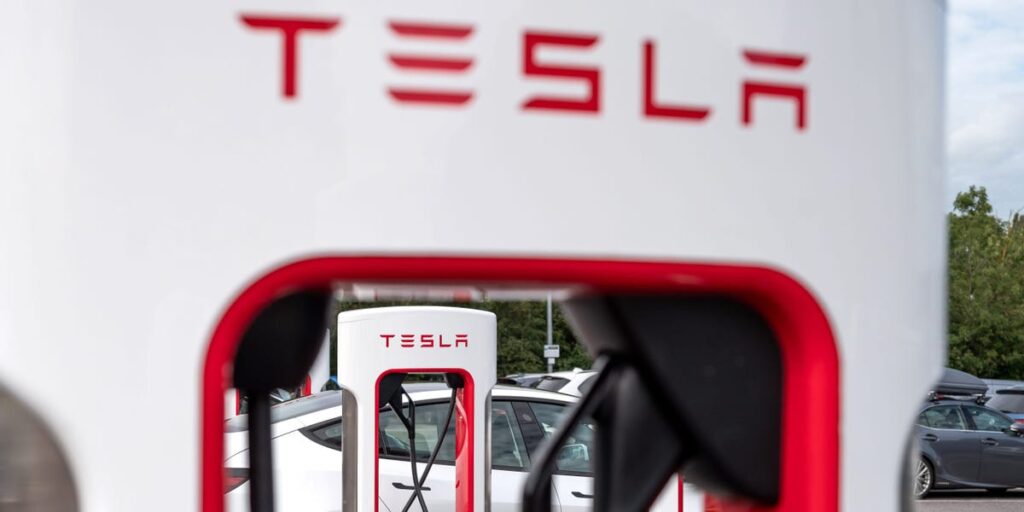Happy Friday! As someone who often sports Crocs, I shouldn’t be offering fashion advice. But I don’t get the hype around these fishnet flats being the shoe of the summer.
In today’s big story, Tesla insiders detail how it needs to rethink its sales strategy amid a shift in the EV market.
But first, what can I do to get you in this car today?
If this was forwarded to you, sign up here.
The big story
For sale
One of Tesla’s biggest assets is its willingness to try new things, but its unique approach to sales is also what’s giving it headaches.
It’s been a tumultuous year for the EV maker and its CEO Elon Musk. Tesla’s delivery numbers dropped for two consecutive quarters, and its market share dipped below 50% for the first time in company history.
A key issue is Tesla’s inability to evolve its sales tactics as the EV market rapidly changes. Business Insider’s Grace Kay spoke to more than a dozen current and former employees in Tesla’s sales division about how the company has tried to kick-start its sales unit.
Not unlike its cars, Tesla’s sales approach is innovative compared to the rest of the automotive industry. It doesn’t rely on third-party dealerships and keeps most of its inventory off-site. There’s also no haggling on price, and online sales make up a good chunk of the business.
It’s a great strategy when the cars sell themselves — which Teslas did for a while — since you don’t need to maintain a traditional sales structure. But Tesla’s approach has fallen flat among mainstream car buyers, leaving it scrambling for a fix.
Tesla’s sales conundrum represents a common mistake tech companies make: pushing for innovation in unwanted places.
The tech industry loves to find inefficiencies in businesses to streamline them, and we love them for that. After all, the result can often be great for customers.
We have on-demand music, movies, and television at our fingertips. You can place a food delivery order in seconds from your couch, and the love of your life might be a few swipes away. What a time to be alive.
But for certain things, people don’t mind a more old-school approach.
Fintechs learned this the hard way when they offered chatbots instead of humans. As much as younger people might hate talking on the phone, they don’t mind it when their money is on the line.
Shopping is another example. Retailers would love to have you make quick, impulsive purchases from your phone. But when it comes to big-ticket items, customers often pivot to their laptops, much to the chagrin of retailers, for what they call “big-screen purchase.”
This gets us back to Tesla. Sure, if your customer base is full of Musk acolytes, you can rely on low-pressure salespeople. But once that well runs dry, you’re going to need someone to pitch apprehensive shoppers.
3 things in markets
- Thinking about buying chip stocks like Nvidia? Timing is everything. The world’s most valuable company — and its peers — won’t be on the up-and-up forever. Investors need to account for this key factor so they aren’t left hanging with ill-timed purchases.
- The three most important letters on Wall Street: CTO. Chief technology officers are finding themselves in the spotlight as finance firms try to leverage AI to drive productivity and save costs. Tech leaders at Citadel, Goldman Sachs, and AllianceBernstein discuss how the job has changed.
- This economist sees multiple rate cuts in our future. Economic data shows we’re on shaky ground and the Fed needs to act fast, according to ING Economics’ James Knightley. Rising jobless claims and a drop in the manufacturing index point to the Fed cutting interest rates more than expected this year.
3 things in tech
- Amazon disappoints investors. The e-commerce giant reported Q2 earnings below expectations. Investors reacted swiftly: Amazon’s stock sank as much as 7% in after-hours trading. Amazon Web Services is a bright spot for the company, though it took customers and employees by surprise by quietly deprioritizing seven cloud services.
- Apple just bought itself some time. Despite reporting a decline in iPhone revenue for its third quarter, Apple’s overall profits still beat Wall Street’s expectations. That gives it a little more time before it has to prove its big AI investments were worth it.
- Meet the 21-year-old behind the AI necklace the internet hates. Avi Schiffmann, founder of the AI friendship necklace Friend, launched a “Black Mirror”-style commercial and spent $1.8 million on a website domain. He smokes a lot of cigarettes, is guided by “personal vibes,” and thinks the haters are just “yappin’.”
3 things in business
- Mark Cuban’s mission to upend Big Pharma. The billionaire “Shark Tank” investor runs a low-cost online pharmacy that offers more than 2,000 mostly generic drugs. Now the company is expanding into imports and competing directly with big names like Pfizer and Novo Nordisk.
- A world of sports streaming, sans football. Venu is a new sports streaming bundle that costs $43 a month — but it doesn’t include most coverage of the biggest sport on television. With a massive hole from missing NFL coverage, is there still an audience for this type of thing?
- Some TikTok career coaches give really bad advice. Shocker! Here are some of the worst tips and hacks creators have shared, which you should ignore. (The white font trick for the bottom of your résumé will almost certainly backfire.)
In other news
What’s happening today
- US Department of Labor releases an employment report, including data on the unemployment rate.
- Chevron, ExxonMobil, and other companies report earnings.
- It’s International Beer Day. Grab a pint!
The Insider Today team: Dan DeFrancesco, deputy editor and anchor, in New York. Jordan Parker Erb, editor, in New York. Hallam Bullock, senior editor, in London. Annie Smith, associate producer, in London. Amanda Yen, fellow, in New York.
Read the full article here


